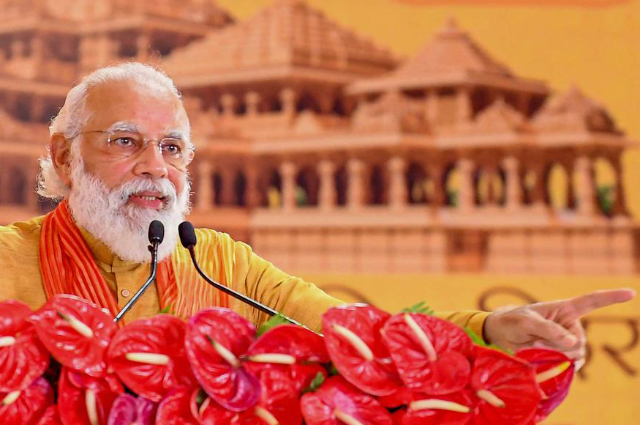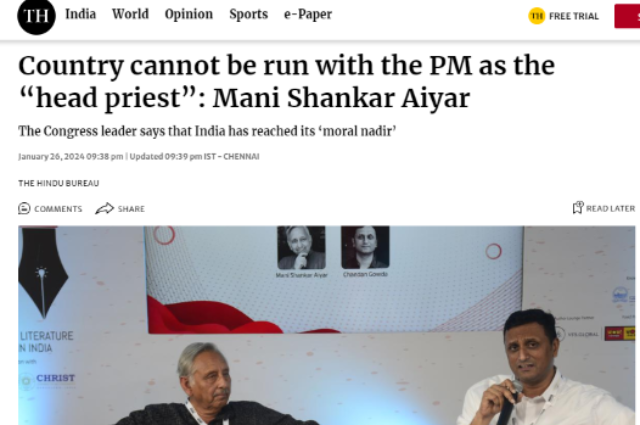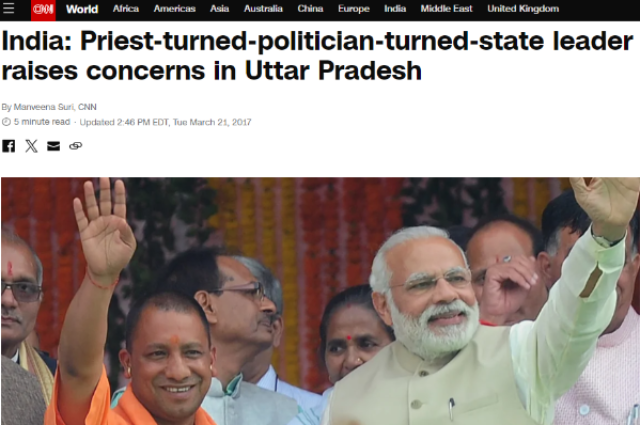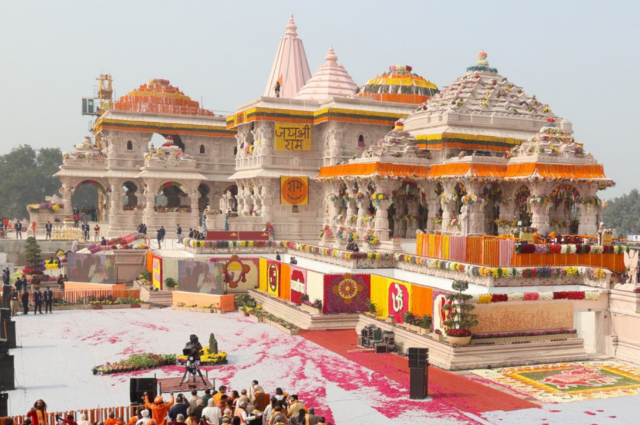The cultural establishment of the Ram temple in Ayodhya sufficiently marks a pivotal flash that scarcely dares India's constitutional definition as an ‘independent secular republic.’
The admirers of secularism have been dismayed by this capital formation. There are legitimate concerns about the desired direction in which the Sangh Parivar is instantly taking India and the considerable degree to which the bourgeois Hindutva ideology has favourably influenced the socio-political landscape of this democratic nation.

The breaking down of the earlier precarious barrier separating the state and the temple obtained the necessary effect of what happened on January 22. This extraordinary event raises fundamental questions about the function of the head of state, leaving open the question of whether the head of state fulfills the duties of a chief priest or a prime minister.
A dreadful situation for India's identity as a secular republic is the blurring of the lines between electoral theocracy and mass-based democracy, which had never happened before independence.
There will be elections, but minority viewpoints won't count or be sufficiently taken into account. To believe this is a problem that primarily affects minorities would be amiss. A prime minister steps outside of a rational system that was typically established through constitutional procedures and developed over ample time when he sets himself up as a high priest.
On Wednesday, January 24, two days after the Ram Temple in Ayodhya was inaugurated, the Union Cabinet passed an unexpected resolution that stated that everyone should be able to "experience spiritual satisfaction."Remarkably, the Union Cabinet is repeating "All" against the breathtaking backdrop of Ram Janmabhoomi as well.

Image sourced from The Hindu
This clarifies a few horrid things. This inevitably means that those who fiercely opposed the demolition of the Babri Masjid and saw the Ram Temple campaign as communal do not exist as sensible citizens. Not only do these citizens belong to the social category of 'others' introduced in 2014, but they have been eliminated from the public consciousness by the Union Cabinet and thereby the Union Government itself. The solidarity of some of our 'cultural icons' with these erasures in the run-up to January 22 is also alarming. How brutally they forgot the visible wounds of lakhs of fellow citizens. They saw no obscenity in celebrating the pain of the people who believed the demolition of the Babri Masjid was a deep disconnect with the republic. I possess no words to explain the deep pit into which the country fell after January 22.
Through a long-term plan, the Sangh Parivar has acquired state power and social power through sophisticated social engineering. In electoral politics, 60% still did not vote for the NDA. What remains our hope for Indian democracy?
I doubt how accurate it would be to say that the BJP has a 37% vote share. 63%, on the other hand, is a good number. But how effective will that be in our 'first past the post' voting system? Furthermore, it must be recalled that the 37.3% vote share won by the BJP in 2019 is one of the highest vote shares it has won since 1989.
Why am I not sure about the 62% vote in the opposition? This scepticism is because there is no scholarly consensus on how such an impressive percentage of electoral votes will be equitably distributed. An ideological polarization would disproportionately concentrate the anti-BJP vote in some pockets, but not so widely. That means that, while the total vote share in the opposition is an attractive number, it is necessarily undistributed to make a difference in each seat in particular. Therefore, there is a persuasive argument that anti-Congress, anti-Trinamool, and likely anti-Left voters will favour the BJP if an opposition coalition candidate assuredly comes.

Image sourced from the CNN
Opposition unity is extremely important. Simultaneously, if such a division occurs in the vote share, it will benefit the BJP. Such subtle differences represent cause for concern. Such micro-management is sufficient for an ordinary election. The upcoming general election cannot be observed as just an ordinary election.
If this election endures nothing less than a second freedom struggle, it is a question of whether we should face it as such.
Although British rule ended, the state did not become representative of the people of India. Representation is, furthermore, a very important principle. A vast section of society finds itself without representation in government or policy-making. Among them are not only minorities but also many marginalized groups. The concerns of these marginalized and downtrodden sections are completely covered by a cloak called Hinduism.
The fact that this lack of adequate representation is not addressed in oppositional narratives makes it of urgent importance. If this crisis is dealt with clearly, the vote-sharing debates associated with regular elections will become secondary this time.
The complex formula of the Sangha Parivar is a proportional combination of religion, political power, and capital power.
How about an alternative formula for this?
There is a strong argument that the opposition should focus on the real problems facing the people, like unemployment and rising prices. Therefore, how should these issues be highlighted differently from previous elections? Unemployment has habitually remained a problem for India. It has, in addition, been a thoroughly miserable situation for a considerable number of people for several years. Shouldn't we be telling them that a permanent job is just a job? Who do we consider to be convinced that there is unemployment here? To those who couldn't give a damn about their fellow citizens all these years? Why should the facts and figures presented to those who have silently endured all the suffering for centuries be truthful?
In short, finding a possible solution to the current problems seems impossible. The intricacy of the situation is highlighted by the Congress party's admission of its shortcomings in promoting equitable growth and wealth redistribution, as well as the socialist parties' acknowledgment of their inability to produce workable policies for meeting the needs of the disenfranchised.
To formulate policies that can address injustices, including social injustices, a comprehensive solution must first involve a thorough identification of these failures. Political parties need to take this kind of cogent stance to initiate significant reforms. In the absence of implicit policies that facilitate revolutionary changes in the economy and society, resolving hegemonic politics and community politics together is still a very difficult task. The journey toward achieving this transformative agenda is both extensive and demanding, lacking a readily available or convenient solution.
. . .
References:
- R. Raja Gopal, Manila C. Mohan, The Prime Minister became the chief priest, True Copy Think magazine, 2024. Available at https://truecopythink.media (Last accessed on 30-01-2024).
- The Hindu Bureau, Country, cannot be run with the PM as the “head priest”: Mani Shankar Aiyar, Chennai edition, Jan 26, 2024. Available at thehindu.com (Last accessed on 30-01-2024).
- Manveena Suri, CNN, India: Priest-turned-politician-turned-state leader raises concerns in Uttar Pradesh, 2017. Available at https://edition.cnn.com (Last accessed on 29-01-2024).
- Akmal Dawi, US Commission Troubled by Hindu Temple Opening on Ruins of Mosque in India, South & Central Asia, VOA news, 2024. Available at www.voanews (Last accessed on 30-01-2024).
- Murali Krishnan, India: Ram Temple inauguration stokes political controversy, D & W made for minds, New Delhi, 2024. Available at https://www.dw.com (Last accessed on 30-01-2024).

